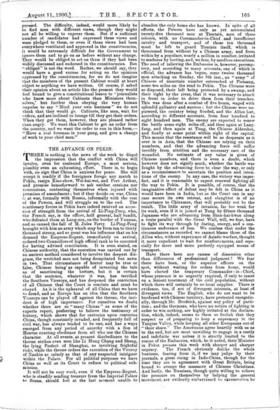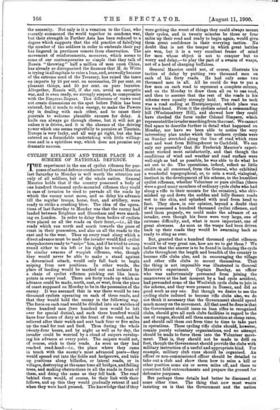THE ADVANCE ON PEKIN.
THERE is nothing in the news of the week to dispel the impression that the conflict with China will involve, even for coalesced Europe, a most serious, possibly even an exhausting, effort. There is, to begin with, no sign that China is anxious for peace. She will accept it readily if the foreigners forego any march to Pekin, resign Kiao-chow, Wei-hai-wei, and Port Arthur, and promise henceforward to ask neither cessions nor concessions, contenting themselves when injured with promises of amendment ; but if they decide on war, China 1; at war, formally with Russia, informally with the rest of the Powers, and will struggle on to the end. The rcactionary forces in Pekin have indeed received an acces- sion of strength from the arrival of Li-Ping-Feng, who, the French say, is the officer, half general, half bandit, who defeated them at Lang-son, on the border of Yunnan, and so caused the fall of M. Jules Ferry. Li-Ping-Peng brought with him an army which may be from ten to thirty thousand strong, and so great was his influence that on his demand the Empress-Regent, immediately on arrival, ordered two Councillors of high official rank to be executed for having advised conciliation. It is even stated, on Chinese authority, that the execution was carried out by an ancient method considered to involve the deepest dis- grace, the wretched men not being decapitated but sawn in two. That circumstance of horror may be true or false, Chinese being' as capable of inventing the tale as of sanctioning the torture, but it is certain that the sentence, whatever it was, has terrified the Southern Viceroys, and has deepened the conviction of all Chinese that the Court is resolute and must be obeyed. As it is the upheaval of all China that we have to dread, and as Europe has an idea that the Southern Viceroys can be played off against the throne, the inci- dent is of high importance. For ourselves we doubt whether there are so "many Chinas" as some of the experts report, preferring to believe the testimony of history, which shows that for centuries upon centuries China, though constantly invaded, and frequently full of civil war, has always tended to be one, and has a ways emerged from any period of anarchy with a Son of Heaven exacting obedience from all who use the Chinese character. At all events, at present disobedience to the throne strikes even men like Li Hung Chang and Sheng, the lying Prefect of Shanghai, as involving frightful risks, while the throne orders the execution of the Viceroy of Nankin as calmly as that of any suspected intriguer within the Palace. For all political purposes we have China as well as its Court to reduce to political sub- mission.
It will not be easy work, even if the Empress-Regent, who is steadily sending treasure from the Imperial Palace to Sean. should feel at the last moment unable to abandon the only borne she has known. In spite of all efforts, the Powers have only as yet accumulated twenty-five thousand men- at Tientsin, men of three colours, with. no Commander-in-Chief . and insufficient cavalry and transport,- and of these ten thousand must be left to guard Tientsin itself, which is threatened from without by a Chinese army, and from within by a populace; nearly a million in number, irritated to madness by looting, and, we fear, by needless executions. The need of relieving the Embassies is, however, peremp- tory, and according to many accounts, one of which is official, the advance has begun, some twelve thousand men attacking on Sunday, the 5th inst., an " army " of Chinese of uncertain number entrenched at Pietsang, some ten miles on the road to Pekin. The Chinese were so disposed, their left being protected by a swamp, and their right by the river, that it was necessary to attack in front in order to drive them from their trenches. This was done after a combat of -five hours, waged with splendid gallantry and success ; but the Chinese were un- pursued, the country being flooded, and the Allies lost, according to different accounts, from four hundred to eight hundred men. The enemy are expected to renew the battle some eight miles off, and then again at Lang. fang, and then again at Tung, the Chinese Aldershot, and finally at some point within sight of the capital. This means that the resistance will be as desperate as it ever is in Asia, that the Chinese are relying on their numbers, and that the advancing force will suffer terribly from attrition and the necessary care of the wounded. No estimate of any value is given of Chinese numbers, and there is even a doubt, which however does not signify much, whether the battle was fought by the advancing force to clear the way, or only as a reconnoissance to ascertain the position and inten- tions of the enemy. In any case, the victory was imper- fect, and it is reasonable to expect renewed fighting all the way to Pekin. It is possible, of course, that the imaginative effect of defeat may be felt in China as it would have been in India, but as the Court can in any case secure its own retreat, and slaughter is of no importance to Chinamen, that will probably not be the result. The little army of invasion, far too weak for its work, even if it is joined at Tung by fifteen thousand Japanese who are advancing from Shan-hai-Ivivan along a route parallel with the Great Wall, will, we fear, have to fight its way through by daring, energy, and a con- tinuous endurance of loss. We confess -that under the circumstances as recorded we cannot blame those of the Allies who, without experience of Asiatic warfare, thought it more expedient to wait for reinforcements, and espe- cially for more and more perfectly equipped means of transport.
Have there been any causes of dissension other than differences of professional judgment ? We fear there have been, or the superior officers on the spot, without waiting for orders from borne, would have elected the temporary Commander - in - Chief, whose presence is so urgently required, if only to insist on a lenient treatment of the civil population, without which there will certainly be no local supplies. There is evidence, too, if not of divergent interests, at least of divergent views. The English, who do not want to be burdened with Chinese territory, have protested energetic- ally, through Mr. Brodrick, against any policy of parti- tion; and the Germans, who have no notion of fighting in order to win nothing, are highly irritated at the declara- tion, which, indeed, seems to them so foolish that they suspect us of preparing to keep a supremacy in the Yangtse Valley, while keeping all other Europeans out of "their share." The Americans agree heartily with us as to the end, but are most unwilling to engage in a, costly and indefinite war unless it is strictly limited to the rescue of the Embassies, which, be it noted, their Minister in Pekin presses this week with sharper and sharper urgency. The French obviously dislike the whole business, fearing from it, if we may judge by their journals, a great rising. in Indo-China, though for the time they are in agreement with Great Britain, being bound . to avenge the massacre of Chinese Christians. And lastly, the Russians, though quite willing, to relieve the pressure on themselves by helping the general movement, are evidently embarrassed to exa.aneration by the necessity. Not only is it a vexation to the Czar, who recently summoned the world together to condemn war, but their strength in Farther Asia has been reduced to a degree which suggests that the old practice of falsifying the number of the soldiers in order to embezzle their pay has lingered in provinces remote from observation. The movement of reinforcements, moreover, which seems to some of our contemporaries so simple that they talk of Russia "throwing" half a million of men upon China, has already so disorganised the finances that M. de Witte is trying in all capitals to raise a loan, and, avowedly because of the extreme need of the Treasury, has raised the taxes on imports by 10 per cent. on necessaries, 20 per cent. on pleasant things, and 50 per cent. on pure luxuries. Altogether, Russia will, if she can, avoid an energetic war, and is even ready, we strongly suspect, to compromise with the Empress-Regent. This difference of views need not create dissensions on the spot before Pekin has been entered, but it tends to relax energy, to make the Powers shy in dealing with each other, and to cause their generals to welcome plausible excuses for delay. A knife can always go through cheese, but it will not go unless it is driven, and it is the absence of the driving power which one seems regretfully to perceive at Tientsin. Europe is very lucky, and. all may go right, but she has entered on a formidable undertaking with little willing- ness and in a spiritless way, which does not promise any dramatic success.



































 Previous page
Previous page